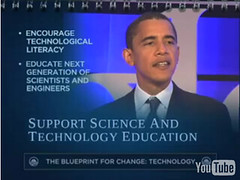Update
 Lately, I've been dreadful at updating my blogs with what's new in my life. What I said in July seems to still hold true a few months later:"My frequency of blogging has gone down lately. Is it because of the pervasiveness of microblogging? For the most part, no. The answer is that I’m consuming a LOT more information than outputting, which leaves little time to share all the great things I’m learning about at the end of the day."The most recent update in my world is that I decided to resign my contract with my employer today (when you work with NASA as a contractor, you're hired by a separate company that then contracts the work to NASA). Being the first "outside" blogger/social media consultant I know of being brought into NASA, I ran up against policies from my employer that made it impossible for me to do the job NASA hired me to do. My employer's policies for digital interaction are outdated, exemplified by the apparent prohibition of instant messaging and social networks during work hours. The policies and mindsets are written in such a way that it makes the use of Twitter akin to playing Solitaire at work. As well as being effective communication protocols that actually increase productivity and open collaboration, they are already receiving widespread usage within NASA. Due to the non-negotiable factor of these policies, it is with regret and deep frustration that I leave this role at NASA, as everything I had understood about their desire to be involved in social media filled me with enthusiasm and excitement and I relished the opportunity to bring my expertise to a new field.
Lately, I've been dreadful at updating my blogs with what's new in my life. What I said in July seems to still hold true a few months later:"My frequency of blogging has gone down lately. Is it because of the pervasiveness of microblogging? For the most part, no. The answer is that I’m consuming a LOT more information than outputting, which leaves little time to share all the great things I’m learning about at the end of the day."The most recent update in my world is that I decided to resign my contract with my employer today (when you work with NASA as a contractor, you're hired by a separate company that then contracts the work to NASA). Being the first "outside" blogger/social media consultant I know of being brought into NASA, I ran up against policies from my employer that made it impossible for me to do the job NASA hired me to do. My employer's policies for digital interaction are outdated, exemplified by the apparent prohibition of instant messaging and social networks during work hours. The policies and mindsets are written in such a way that it makes the use of Twitter akin to playing Solitaire at work. As well as being effective communication protocols that actually increase productivity and open collaboration, they are already receiving widespread usage within NASA. Due to the non-negotiable factor of these policies, it is with regret and deep frustration that I leave this role at NASA, as everything I had understood about their desire to be involved in social media filled me with enthusiasm and excitement and I relished the opportunity to bring my expertise to a new field.
I am not the first social media person to run into these types of issues in government services that affect me doing my job. Tara Hunt has a blog post from 2007 on "The Brown Act of 1953: how this positive policy now negatively affects civic collaboration".
Despite the unfortunate situation, I feel that the space community at large is truly wonderful and full of potential for social media, transparency and collaboration. The end goal of my program at NASA was to make NASA more open so people will begin to utilize NASA's vast amount of data (98% of everything they do is available publicly, just not well-communicated).This is also an interesting time to be involved with technology policies and the government. I intend to write a blog post in the coming weeks that goes into more detail on my personal experience over the last few months and analysis of why government maybe isn't ready for 2.0 just yet (but they're eager to be).TechCrunch today posted Barack Obama On Tech Policy. A few quotes to pull out that I find especially relevant to my experience:• "Create a transparent and connected democracy"• "We will put government data online in universally accessible formats"• "To seize this moment, we have to connect all of America to 21st century infrastructure"• "If we make technological literacy a fundamental part of education, then we can ... ensure the next generation of scientists and engineers is being educated right here in America"• "Together, we harness technology to confront the biggest challenges that America faces, just imagine what we could do!"For now, I will continue imagining what NASA can do on an informal basis :)